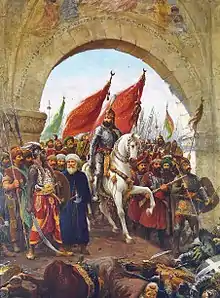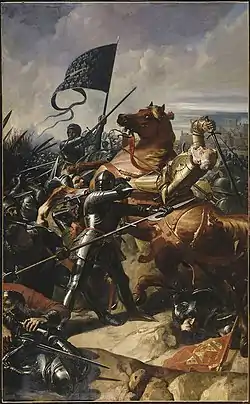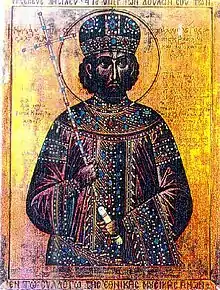1453
Year 1453 (MCDLIII) was a common year starting on Monday of the Julian calendar, the 1453rd year of the Common Era (CE) and Anno Domini (AD) designations, the 453rd year of the 2nd millennium, the 53rd year of the 15th century, and the 4th year of the 1450s decade.
| Millennium: | 2nd millennium |
|---|---|
| Centuries: | |
| Decades: | |
| Years: |
| 1453 by topic |
|---|
| Arts and science |
|
| Leaders |
|
| Birth and death categories |
| Births – Deaths |
| Establishments and disestablishments categories |
| Establishments – Disestablishments |
| Art and literature |
| 1453 in poetry |
| Gregorian calendar | 1453 MCDLIII |
| Ab urbe condita | 2206 |
| Armenian calendar | 902 ԹՎ ՋԲ |
| Assyrian calendar | 6203 |
| Balinese saka calendar | 1374–1375 |
| Bengali calendar | 860 |
| Berber calendar | 2403 |
| English Regnal year | 31 Hen. 6 – 32 Hen. 6 |
| Buddhist calendar | 1997 |
| Burmese calendar | 815 |
| Byzantine calendar | 6961–6962 |
| Chinese calendar | 壬申年 (Water Monkey) 4149 or 4089 — to — 癸酉年 (Water Rooster) 4150 or 4090 |
| Coptic calendar | 1169–1170 |
| Discordian calendar | 2619 |
| Ethiopian calendar | 1445–1446 |
| Hebrew calendar | 5213–5214 |
| Hindu calendars | |
| - Vikram Samvat | 1509–1510 |
| - Shaka Samvat | 1374–1375 |
| - Kali Yuga | 4553–4554 |
| Holocene calendar | 11453 |
| Igbo calendar | 453–454 |
| Iranian calendar | 831–832 |
| Islamic calendar | 856–857 |
| Japanese calendar | Kyōtoku 2 (享徳2年) |
| Javanese calendar | 1368–1369 |
| Julian calendar | 1453 MCDLIII |
| Korean calendar | 3786 |
| Minguo calendar | 459 before ROC 民前459年 |
| Nanakshahi calendar | −15 |
| Thai solar calendar | 1995–1996 |
| Tibetan calendar | 阳水猴年 (male Water-Monkey) 1579 or 1198 or 426 — to — 阴水鸡年 (female Water-Rooster) 1580 or 1199 or 427 |

Benjamin-Constant: The Entry of Mehmed II into Constantinople
It is sometimes cited as the notional end of the Middle Ages by historians who define the medieval period as the time between the Fall of the Western Roman Empire and the fall of the Eastern Roman Empire.[1]
Events
January–December
- April – Tarabya and Studius are taken by the Ottoman Empire, in preparation for the assault on Constantinople, as are the Prince Islands, by the Ottoman fleet under Admiral Baltaoglu.

Sultan Mehmed II's entry into Constantinople, Fausto Zonaro (1854–1929)
- April 6–May 29 – Siege and Fall of Constantinople: The Ottoman Sultan Mehmed the Conqueror puts a decisive final end to the Eastern Roman Empire, nearly one and a half thousand years after its foundation by Augustus, by capturing the capital, Constantinople.[2] Mortars are (perhaps) used in battle for the first time in this action. The consequent closure of the traditional overland route from Western Europe to the Far East, and need to identify new maritime routes, leads to the Age of Discovery, and ends the Middle Ages.[3]
- May 22 – May 1453 lunar eclipse, a partial eclipse, is visible during the siege of Constantinople.

Battle of Castillon
- July 17 – Battle of Castillon: In the last pitched battle of the Hundred Years' War, the French under Jean Bureau defeat the English under the Earl of Shrewsbury, who is killed.[4]
- July 23 – Battle of Gavere in Flanders: Philip the Good, Duke of Burgundy, is victorious over the rebels of Ghent, leading to surrender of their city and the end of the Revolt of Ghent.
- October 19 – The French recapture Bordeaux, ending the Hundred Years' War and leaving the English retaining only Calais on French soil.
- October 28 – Ladislaus the Posthumous is crowned King of Bohemia, although George of Poděbrady remains in control of the government.
- November 10 – Sejo of Joseon kills his enemy General Kim Jong-seo and gains control of the government in Joseon Korea (where this rebellion is called Gyeyujeongnan).
Births
- January 1 – Bernardin Frankopan, Croatian nobleman, diplomat and soldier (d. 1529)
- February 6 – Girolamo Benivieni, Florentine poet (d. 1542)
- March 2 – Johannes Engel, German doctor, astronomer and astrologer (d. 1512)[5]
- March 3 – Philip II, Count of Waldeck-Eisenberg (1486–1524) (d. 1524)
- March 25 – Giuliano de' Medici, co-ruler of Florence with Lorenzo de' Medici (d. 1478)
- April 18 – Margaret of Brandenburg, abbess of the Poor Clares monastery at Hof (d. 1509)
- May 13 – Mary Stewart, Countess of Arran, Scottish princess (d. 1488)
- June 10 – Francesco Soderini, Catholic cardinal (d. 1524)
- September 1 – Gonzalo Fernández de Córdoba, Spanish general and statesman (d. 1515)
- October 13 – Edward of Westminster, Prince of Wales (d. 1471)[6]
- November 13 – Christoph I, Margrave of Baden-Baden (1475–1515) (d. 1527)
- November 17 – Alfonso, Prince of Asturias (d. 1468)
- date unknown – Jacob Obrecht, Flemish composer (d. 1505)
- probable – Afonso de Albuquerque, Portuguese admiral (d. 1515)
Deaths
- February 28 – Isabella, Duchess of Lorraine (b. 1400)
- May 29
- Constantine XI Palaiologos, last Byzantine Emperor (b. 1405)
- Athanasius II of Constantinople, Ecumenical Patriarch of Constantinople
- Theophilos Palaiologos, Byzantine grammarian, humanist and mathematician. Cousin of Constantine XI.
- Demetrios Palaiologos Metochites, last governor of Constantinople
- Orhan Çelebi, Ottoman prince (b. 1412)
- June 1
- Çandarli Halil Pasha, Ottoman grand vizier
- Giovanni Giustiniani, Italian captain
- June 2 – Álvaro de Luna, Duke of Trujillo, Constable of Castille
- June 3 – Loukas Notaras, last megas doux of the Byzantine Empire (b. 1402)
- June 4 – Andronikos Palaiologos Kantakouzenos, last Grand Domestic of the Byzantine Empire
- July 17
- Dmitry Shemyaka, Grand Prince of Moscow
- John Talbot, 1st Earl of Shrewsbury, English military leader[4]
- July 20 – Enguerrand de Monstrelet, French chronicler
- October 13 – Jacob, Margrave of Baden-Baden (1431-1453) (b. 1407)
- October 20 – Yi Jing-ok, Korean military General (b. 1399)[7]
- December 24 – John Dunstaple, English composer (b. 1390)
- Demetrius III, former co-king of Georgia (b. c. 1413)
References
- G. R. Potter, "The Fall of Constantinople? History Today (Jan 1953) 3#1 pp 41-49.
- "What Happened In 1453". Hisdates. Retrieved August 8, 2017.
- Crowley, Roger (2006). Constantinople: The Last Great Siege, 1453. Faber. ISBN 0-571-22185-8. (reviewed by Foster, Charles (September 22, 2006). "The Conquest of Constantinople and the end of empire". Contemporary Review. Archived from the original on March 27, 2007.
It is the end of the Middle Ages
) (Archived Link) - Sir Richard Lodge (1910). The Close of the Middle Ages, 1272-1494. Rivingtons. p. 358.
- Trimble, Virginia; Williams, Thomas R.; Bracher, Katherine; Jarrell, Richard; Marché, Jordan D.; Ragep, F. Jamil (September 18, 2007). Biographical Encyclopedia of Astronomers. Springer Science & Business Media. p. 339. ISBN 978-0-387-30400-7.
- Charles Kidd; Christine Shaw (June 24, 2008). Debrett's Peerage & Baronetage 2008. Debrett's. p. 140. ISBN 978-1-870520-80-5.
- 충강공 이징옥 장군 (in Korean)
This article is issued from Wikipedia. The text is licensed under Creative Commons - Attribution - Sharealike. Additional terms may apply for the media files.
